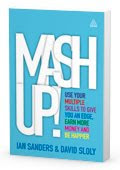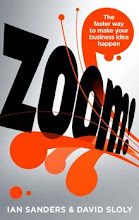So my third book ‘Zoom!’ is now well and truly published; it’s on the bookshelves in UK stores and the first international orders are now being fulfilled. At the same time, I’m already working on book four, ‘Mash-Up’ (my second collaboration with David Sloly). So it’s that part of the journey where post-it notes are being stuck on the wall, interviews and research conducted, and evenings invested in editing and writing.
Of course, in this world you can’t *just* be an author anymore, you have to be a content creator (as well as a promoter of course). Content creation doesn’t stop with the manuscript, you have to think about the guest posts you’ll write for other sites, the video interviews you’ll grab so you have extra content, the stories you’ll reversion into manifestos and so on.
That multi-platform landscape is now where all marketing is played out and it’s something I evangelise to my business clients, ensuring that their message and content sweats, that they tell their story simultaneously across different platforms.
One of my own goals is to to become platform-agnostic in my business storytelling; to not stop at books, columns, blog posts or videos. So I’ve just started contributing to Monocle magazine’s new online radio channel Monocle 24, interviewing business pioneers for their show ‘The Entrepreneurs’. I’ve loved the quality of Monocle content since they launched the print title; now having contributed to the magazine it’s great to tell entrepreneurial stories for Monocle 24. Sure - this is not going to replace core business as the dominant activity, but it’s a natural by-product, another string to my bow. And on a personal note, conducting interviews takes me back twenty five years to when I started out, working on BBC local radio. One of my first interviews, back in November 1986 when I’d just left school, was with Billy Bragg (I’ve put it on YouTube here). The current series of interviews for Monocle includes Guy Kawasaki, Founder of Moo.com Richard Moross and French Radio London CEO Pascal Grierson. They’ll be featuring on ‘The Entrepreneurs’ show over the coming weeks, check the website here or follow me on Twitter for details on when they go live.
So have a think how the shifting content landscape can enable you to add another string to your bow. What additional talents or products can you offer the market? Have a think about those natural by-products. Can multiple platform opportunities act as a catalyst for your skills going ‘multi-media’ in 2012?
Stop thinking singular; start acting plural!
Of course, in this world you can’t *just* be an author anymore, you have to be a content creator (as well as a promoter of course). Content creation doesn’t stop with the manuscript, you have to think about the guest posts you’ll write for other sites, the video interviews you’ll grab so you have extra content, the stories you’ll reversion into manifestos and so on.
That multi-platform landscape is now where all marketing is played out and it’s something I evangelise to my business clients, ensuring that their message and content sweats, that they tell their story simultaneously across different platforms.
One of my own goals is to to become platform-agnostic in my business storytelling; to not stop at books, columns, blog posts or videos. So I’ve just started contributing to Monocle magazine’s new online radio channel Monocle 24, interviewing business pioneers for their show ‘The Entrepreneurs’. I’ve loved the quality of Monocle content since they launched the print title; now having contributed to the magazine it’s great to tell entrepreneurial stories for Monocle 24. Sure - this is not going to replace core business as the dominant activity, but it’s a natural by-product, another string to my bow. And on a personal note, conducting interviews takes me back twenty five years to when I started out, working on BBC local radio. One of my first interviews, back in November 1986 when I’d just left school, was with Billy Bragg (I’ve put it on YouTube here). The current series of interviews for Monocle includes Guy Kawasaki, Founder of Moo.com Richard Moross and French Radio London CEO Pascal Grierson. They’ll be featuring on ‘The Entrepreneurs’ show over the coming weeks, check the website here or follow me on Twitter for details on when they go live.
So have a think how the shifting content landscape can enable you to add another string to your bow. What additional talents or products can you offer the market? Have a think about those natural by-products. Can multiple platform opportunities act as a catalyst for your skills going ‘multi-media’ in 2012?
Stop thinking singular; start acting plural!


















